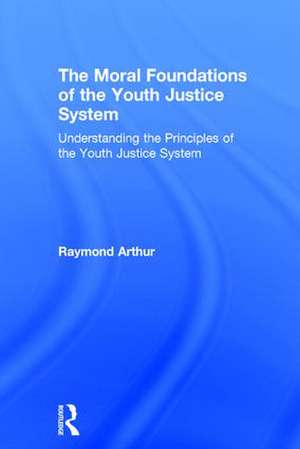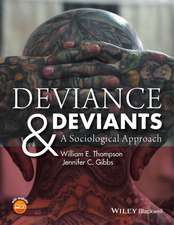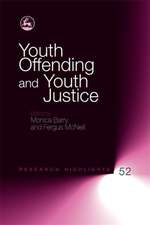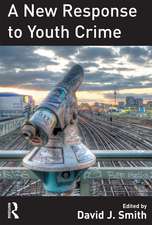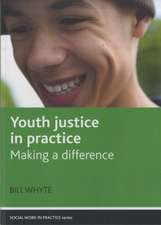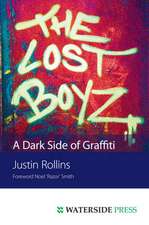The Moral Foundations of the Youth Justice System: Understanding the principles of the youth justice system
Autor Raymond Arthuren Limba Engleză Hardback – 16 dec 2016
In The Moral Foundations of the Youth Justice System, Raymond Arthur explores international and historical evidence on how societies regulate criminal behaviour by young people, and undertakes a careful examination of the developmental capacities and processes that are relevant to young people’s criminal choices. He argues that the youth justice response needs to be reconceptualised in a context where one of the central objectives of institutions regulating children and young people’s behaviour is to support the interests and welfare of those children.
This timely book advocates a revolutionary transformation of the structure and process of contemporary youth justice law: a synthesised and integrated approach that is clearly distinct from that used for dealing with adults. This book is a key resource for students, academics and practitioners across fields including criminal law, youth justice, probation and social work.
| Toate formatele și edițiile | Preț | Express |
|---|---|---|
| Paperback (1) | 358.19 lei 6-8 săpt. | |
| Taylor & Francis – 23 dec 2016 | 358.19 lei 6-8 săpt. | |
| Hardback (1) | 761.76 lei 6-8 săpt. | |
| Taylor & Francis – 16 dec 2016 | 761.76 lei 6-8 săpt. |
Preț: 761.76 lei
Preț vechi: 1025.99 lei
-26% Nou
Puncte Express: 1143
Preț estimativ în valută:
145.80€ • 150.25$ • 123.09£
145.80€ • 150.25$ • 123.09£
Carte tipărită la comandă
Livrare economică 03-17 martie
Preluare comenzi: 021 569.72.76
Specificații
ISBN-13: 9781138781665
ISBN-10: 1138781665
Pagini: 132
Dimensiuni: 156 x 234 mm
Greutate: 0.32 kg
Ediția:1
Editura: Taylor & Francis
Colecția Routledge
Locul publicării:Oxford, United Kingdom
ISBN-10: 1138781665
Pagini: 132
Dimensiuni: 156 x 234 mm
Greutate: 0.32 kg
Ediția:1
Editura: Taylor & Francis
Colecția Routledge
Locul publicării:Oxford, United Kingdom
Public țintă
Postgraduate and UndergraduateCuprins
1. Introduction
2. The origins of childhood and the youth justice system
2.1 Development of the concept of Childhood
2.2 Parens patriae
2.3 Statutory protection of childhood
2.4 Development of a separate youth criminal justice system
2.5 The decline of welfarism, re Gault and the rise of individual active citizens
2.6 Conclusions
3. New Labour, new youth justice, new century
3.1 Age of criminal responsibility
3.2 Welfare of the child
3.3 Restorative justice
3.4 Punishing parents
3.5 Net widening
3.6 Custodial sanctions
3.7 Youth justice 2010-2015: coalition government and the Big Society
3.8 Conclusions
4. The impact of international law
4.1 Historical development of international law on children’s rights
4.2 United Nations Convention on the Rights of the Child
4.3 Protect the best interests of the child
4.4 Support families and involve communities
4.5 Age-appropriate treatment
4.6 Diversion
4.7 Child’s voice must be heard
4.8 Conditions in custody
4.9 Application of the United Nations Convention on the Rights of the Child
4.10 Conclusions
5. Young people who offend
5.1 Young offenders and their family life
5.2 Teenage Parents
5.3 Poverty
5.4 Experience of school
5.5 Mental Health
5.6 Addiction issues
5.7 Cognitive functioning and decision making
5.8 Children in care
5.9 Conclusions
6. Impact of criminalisation
6.1 Education and employment
6.2 Restorative justice
6.3 Custody
6.4 Conditions in custodial institutions
6.5 What works in preventing offenders re-offending
6.6 Public opinion
6.7 Conclusions
7. Young people, the youth court and the right to a fair trial
7.1 Young people’s experiences
7.2 The European Convention on Human Rights
7.3 The Mental Health Act 1983
7.4 Stay of proceedings
7.5 Fitness to plead
7.6 Conclusions
8. The youth justice system and theories of punishment
8.1 Youth criminal law as retribution
8.2 Deterrence/Prevention
8.3 Public Censure/ Restorative justice
8.4 Conclusions
9. Conclusions
2. The origins of childhood and the youth justice system
2.1 Development of the concept of Childhood
2.2 Parens patriae
2.3 Statutory protection of childhood
2.4 Development of a separate youth criminal justice system
2.5 The decline of welfarism, re Gault and the rise of individual active citizens
2.6 Conclusions
3. New Labour, new youth justice, new century
3.1 Age of criminal responsibility
3.2 Welfare of the child
3.3 Restorative justice
3.4 Punishing parents
3.5 Net widening
3.6 Custodial sanctions
3.7 Youth justice 2010-2015: coalition government and the Big Society
3.8 Conclusions
4. The impact of international law
4.1 Historical development of international law on children’s rights
4.2 United Nations Convention on the Rights of the Child
4.3 Protect the best interests of the child
4.4 Support families and involve communities
4.5 Age-appropriate treatment
4.6 Diversion
4.7 Child’s voice must be heard
4.8 Conditions in custody
4.9 Application of the United Nations Convention on the Rights of the Child
4.10 Conclusions
5. Young people who offend
5.1 Young offenders and their family life
5.2 Teenage Parents
5.3 Poverty
5.4 Experience of school
5.5 Mental Health
5.6 Addiction issues
5.7 Cognitive functioning and decision making
5.8 Children in care
5.9 Conclusions
6. Impact of criminalisation
6.1 Education and employment
6.2 Restorative justice
6.3 Custody
6.4 Conditions in custodial institutions
6.5 What works in preventing offenders re-offending
6.6 Public opinion
6.7 Conclusions
7. Young people, the youth court and the right to a fair trial
7.1 Young people’s experiences
7.2 The European Convention on Human Rights
7.3 The Mental Health Act 1983
7.4 Stay of proceedings
7.5 Fitness to plead
7.6 Conclusions
8. The youth justice system and theories of punishment
8.1 Youth criminal law as retribution
8.2 Deterrence/Prevention
8.3 Public Censure/ Restorative justice
8.4 Conclusions
9. Conclusions
Notă biografică
Raymond Arthur is Reader in Law at Northumbria University, UK, and the author of Young Offenders and the Law (Routledge, 2010). He has collaborated with researchers, practitioners, non-governmental organisations (NGOs) and charities to develop new approaches to responding to youth offending.
Recenzii
'This text makes a valuable contribution to contemporary youth justice with its thoroughgoing analysis of a much neglected issue. Arthur offers an informed, insightful and welcome exposition of the moral foundations of responses to youth offending; one that supplements and extrapolates the existing literature.'
Stephen Case, Professor of Criminology in the Department of Social Sciences, Loughborough University, UK
Stephen Case, Professor of Criminology in the Department of Social Sciences, Loughborough University, UK
Descriere
This book explores international and historical evidence on how societies regulate criminal behaviour by young people and asks whether young people should be treated as responsible moral and legal agents in the youth justice system.
